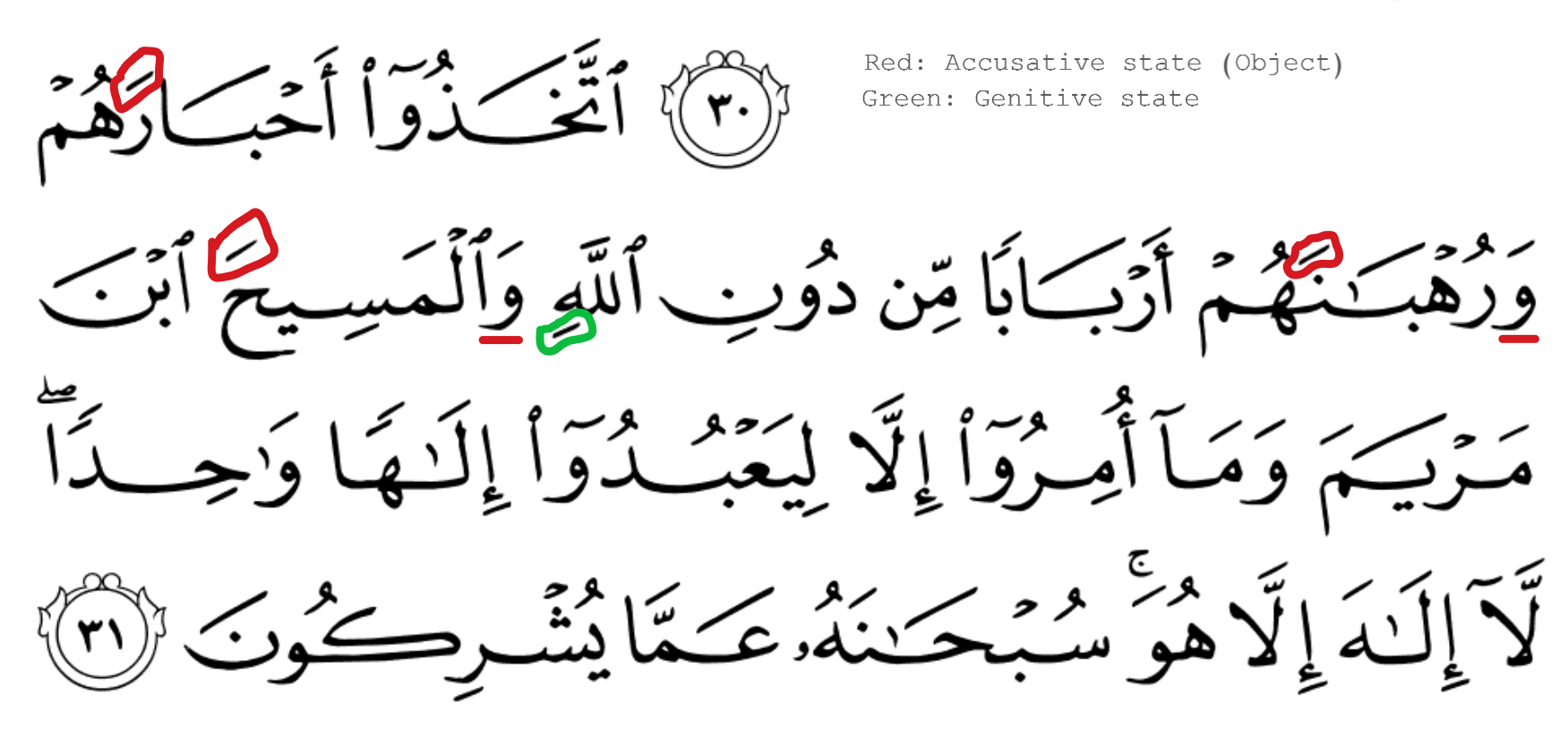Recently, some of the Christian apologists have been heard claiming that the Holy Qur’ān calls to the worship of Jesus عليه السلامalong with Allah ﷻ. It is a pity that they do not focus on learning anything, while they seem ready to debate everything. Their claim is based on of verse 31 of Surat at-Tawbah (chapter 9). The part is as follows:
{… اتَّخَذُوا أَحْبَارَهُمْ وَرُهْبَانَهُمْ أَرْبَابًا مِنْ دُونِ اللَّهِ وَالْمَسِيحَ ابْنَ مَرْيَمَ}
“They took their scholars and monks as lords besides Allah, and the Messiah…”
This doubt can be answered in multiple ways –
- Grammatically: Jesus is the object here, thereby connected to the rest of the objects (i.e: scholars and monks)
The word ‘Maseeh’ is in the accusative state (mansūb), hence read: Maseeha-, which makes him the object, thereby connecting it to the first two objects namely ‘aḥbār’ and ‘ruhbān’ (scholars and monks). On the other hand, the word ‘Allāh’ is in the genitive state (majrūr) here (hence read: –illāhi). So, had it been that Jesus was intended to be in the hierarchy of Lordship of Allāh, then the word ‘Maseeh’ would have been in ‘atf (i.e: connection) with the word ‘Allāh’, and in that case the verse should have been (arbābam min dūnillāhi wal masēḥibni Maryam-) and not (wal maseeḥabna Maryam).

2) Reading the entire verse: Apart from the linguistic structure of this verse, Allāh Almighty says in the very next sentence “And they were not commanded except to worship One God, there is no deity except Him. Exalted is He above whatever they associate with Him”. Hence, the verse itself refutes this doubt, if read entirely.
3) The order of placement in this way has occurred many times in the Qur’ān. It is a distinct topic of study in the Arabic grammar, known as “taqdēm and ta`khēr”, which comes for eloquence. It is further divided into multiple kinds, but this isn’t the place to discuss all of them.
4) This isn’t the only place where taqdēm and ta`khēr is used in the Qur’ān, rather there are numerous other examples of it, some of them are –
- Surat al-Baqara [2: 285]
(…ءَامَنَ ٱلرَّسُولُ بِمَاۤ أُنزِلَ إِلَیۡهِ مِن رَّبِّهِۦ وَٱلۡمُؤۡمِنُونَۚ)
“The Messenger has believed in what was revealed to him from his Lord, and [so have] the believers…”
- Also from the examples is Surat al-Muddatthir [74: 31]
وَمَا جَعَلْنَا عِدَّتَهُمْ إِلَّا فِتْنَةً لِلَّذِينَ كَفَرُوا لِيَسْتَيْقِنَ الَّذِينَ أُوتُوا الْكِتَابَ وَيَزْدَادَ الَّذِينَ آمَنُوا إِيمَانًا ۙ وَلَا يَرْتَابَ الَّذِينَ أُوتُوا الْكِتَابَ وَالْمُؤْمِنُونَ ۙ وَلِيَقُولَ الَّذِينَ فِي قُلُوبِهِمْ مَرَضٌ وَالْكَافِرُونَ مَاذَا أَرَادَ اللَّهُ بِهَٰذَا مَثَلًا
“And We have not made their number except as a trial for those who disbelieve – that those who were given the Scripture will be convinced and those who have believed will increase in faith and those who were given the Scripture and the believers will not doubt and that those in whose hearts is hypocrisy and the disbelievers will say, “What does Allah intend by this as an example?”…”
- And, Surah al-Jinn [72: 10]
{وأنَّا لا ندري أشَرٌ أُريدَ بِمَنْ في الأرضِ أَمْ أرادَ بِهِمْ ربُّهُمْ رَشَدا}
“And we do not know [therefore] whether evil is intended for those on earth or whether their Lord intends for them a right course.”
This, and Allāh knows best.
(February 27th, 2021)

